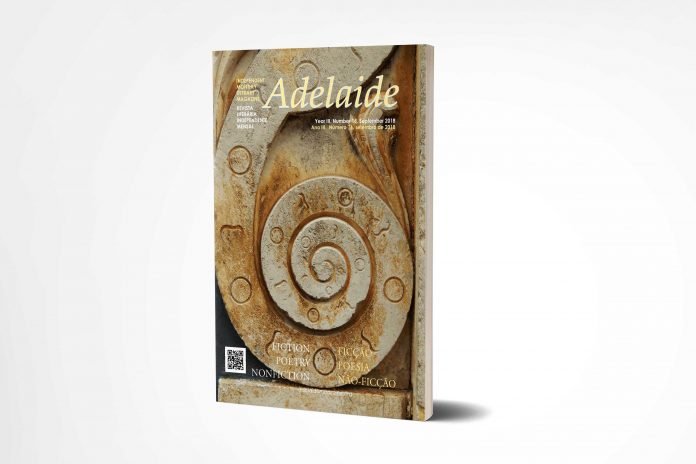IDENTITY by Jan Wiezorek IdentityWho knows that he’s a young male, though all muscleand inbred so much as to make problems managing identity.He hears tree frogs click open the legs of a wetland.No one hears the swan unfolding her neck against bills sucking upthe slop like a windup toy ending its cycle, revealing the perfect ducknear short hairs of a bulldog. Look up under every cardinal hugging this tail of nature,showing its sex in color of mallards floating up-butted across brown and black fuzz.Who marks identity as a caterpillar wishing for wings and milkweed? Kelly green ferns spring,but some could be asexual: what secret thrill the warble watertoasting algae among the spots, asking for a friend with whom to float,dreaming the words “identify as.” Wasteremoving our teeth | throwing them with the plastic utensils into the sea | along the grid steps | the EGK of hearts skipping | | | tripping over | a | beat | |careening | on cobblestones | how the boy holds the door | and cannot smile | so we all bow | reach down to receive | placing refuse in his cup |what to do next | how winds jostle the palms fringing | naming | soundings that fit in quadrilaterals | in triangles of refuse | nestled on the pier of all voices | from this height dreaming again | floating as on the waterof us | how we twist to see and stumble | we are half-dying against a milk bottle | cap | blue as the water on the night in which the garbage arrived | uncertainhow lovely the light reflects that which we toss away | spangles as innocent as straws for the pelicans | stripes for the screams of birds | GuiltI was on a mule’s back, and my guide took me through the town of no streets, among the lane of concrete slip dashand up into the hills where smoke rose from open-air stoves. I looked down upon a wild view of water cascading into the pondwhere some boys were swimming. My guide, a young man, admired my wristwatch in the days when time was popular, and asked meif I would give it to him. I thought it was a question . . . unthinkable at the time and certainly a thing . . . to be kept.By me, after all. Mine. Those trees are mine. As my guide is mine. As water rushing through the sunlight of my belongings.To pacify myself, I call it important work to pick up litter, a retrieved cigarette with a filter dried thru wintery survival.Under grass, the purple pocks, invisible in square ground,that which screams in yellow what we are hidingunder wounds, surviving in our casing,settling in a wood chip gouged in the neck,down deep so, under the field, the pond.The watch long since given away. And others like it.And some lay in my desk drawer— never used or admired.Ourselves, where the story thinks and means: that it can mean hidden and ticking. The Flame Against the BaysideLike him, we all wear our own versions of a black bow tie and white shirt, dark coat and trousers. The night matches intensity in our eyes. What light remains shines on almond skin and broad forehead. We carry dark leather portfolios and a demeanor that stands tall along flat stones. Flash of fireworks, flame against bayside, a romantic candle— all these sources light our faces in the sway of shoulders, staying pressed in night turning our sweat to skin: seeking adventure in delightful purpose, our spirits walking within the sounds of our steps. Out the WindowMore about the reflections of yourself than the weight pulling at your gut,a waist as loose as a goose, stretchable, knowing the affirmation of a brown belly,large and distinctive, without noticing the turns and pauses held in glass,interrupting the grass and the bruised orange of a brown worm taking afternoon sun,appearing to move as light moves, heating the shadows fled from branchesto scatter the lawn. One end investigates, as a worm moves with wondersfinding its way, grounded. A robin looks thru the windowinto the eternal now, and as long as you look and the robin looks, future is put on hold,commanding the present like a growling stomach.Think about eating, but before turning, the bird takes the worm— the end farthest away.It does not suck like you suck noodles, but the movementappears for effect. One can only see this happen by using an index fingerand tracing the route of a supposed worm inside the throat, imaginingthe route a worm takes beyond a beak, a mouth, vacuuming the five-inch worm, as an Asian noodle dish appears to the collective mind.You leave the window and enter the kitchen. Sublime,awesome, monstrous, exciting, filled with an attitude.Adventure as patient as a robin, an endgame of love for a worm—and an empty stomach. About the Author: Jan Wiezorek writes from Barron Lake in Michigan. He has taught writing at St. Augustine College, Chicago, and his poetry has appeared or is forthcoming at The London Magazine, Southern Pacific Review, L’Ephemere Review, Yes Poetry, Scarlet Leaf Review, Xavier Review, and Modern Poetry Quarterly Review, among other literary and online journals. He is author of Awesome Art Projects That Spark Super Writing (Scholastic, 2011) and holds a master’s degree in English Composition/Writing from Northeastern Illinois University, Chicago. Visit him atjanwiezorek.weebly.com |



















